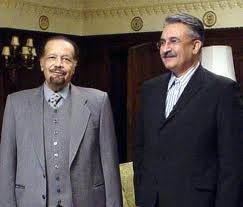A Quote by Al Gore
If you want your energy bills to go up, you should support an ever greater dependence on foreign oil, because the rate of new discoveries is declining as demand in China and India is growing, and the price of oil and thus the price of coal will go sky high.
Related Quotes
I do believe that oil production globally has peaked at 85 million barrels. And I've been very vocal about it. And what happens? The demand continues to rise. The only way you can possibly kill demand is with price. So the price of oil, gasoline, has to go up to kill the demand. Otherwise, keep the price down, the demand rises.
The oil companies are really making a very lucrative amount of profit from the high price of oil. I don't that they're very keen to reduce the price of oil. The consumers are those who are the victims so I think that the producers, the governments, some of them, they're enjoying the high revenue that they get.
In the near term, oil is galloping ahead and leading our economy. We have to corral the "horse" and gradually reduce our dependence on oil and coal, in their present forms. Green-energy investment is inherently high-tech, and we could lead in the next-generation energy technologies, as we did and do now with oil and gas. All it takes is leadership!
There's no free lunch. If you want an industrial economy, you need energy. If you want energy, it will produce pollution. You can have it in two forms. You can have it dissipated in the atmosphere - like carbon dioxide - which then you cannot recover, or you can have the waste concentrated in one small space like nuclear. That is far easier to deal with. The idea that you can be able to create renewable energy at a price anywhere near the current price for oil or gas or coal is a fantasy.
Over time, there's a very close correlation between what happens to the dollar and what happens to the price of oil. When the dollar gets week, the price of oil, which, as you know, and other commodities are denominated in dollars, they go up. We saw it in the '70s, when the dollar was savagely weakened.
Oil is a tangible commodity, so there is a global market. The fact that we may need less may affect the global price because we're big consumers: we probably take about a quarter of global demand. But if suddenly, let's just use a crazy example, fighting in the Middle East led to the closure of the Strait of Hormuz and no oil could get out through the Strait of Hormuz, well that would affect China, India, Europe, it will affect the whole global economy. It will affect us, too, then.
About 75% of the price of gas is really dictated by crude oil. At the heart of the issue is increasing demand over a period of many years around the world. World crude oil consumption now is close to 90 million barrels a day. Most of the growth in demand is coming from China and the developing world.
Speculation in oil stock companies was another great evil ... From the first, oil men had to contend with wild fluctuations in the price of oil. ... Such fluctuations were the natural element of the speculator, and he came early, buying in quantities and holding in storage tanks for higher prices. If enough oil was held, or if the production fell off, up went the price, only to be knocked down by the throwing of great quantities of stocks on the market.


































